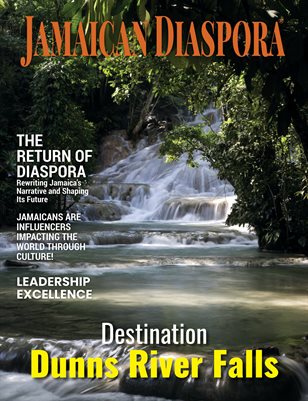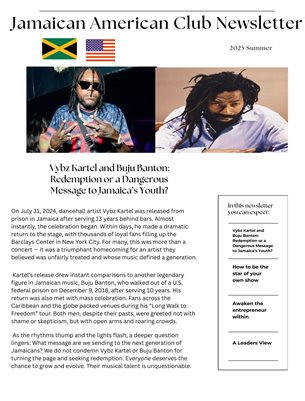(One Dance Won’t Do)
By Myrna Loy
He stood there against the wall, dressed in a silvery-grey suit, razor sharp seams, toes turned outwards; silk socks and crocodile shoes. He was standing in between his two bredren - one arm hugging his waist while supporting the elbow of his other arm so that his fingers could stroke the stubble on his chin. He was rocking his head to the music – a leather cap tilted precariously on one side of his head. From a distance it looked like he was sneering. He closed his eyes slightly, raised an eyebrow, and looked straight at me. I rolled my eyes but couldn’t help grinning. Just look at him I thought: “ ‘im tink him nice - who stands up like that these days? I said to myself, while another part of me was thinking... he’s too cute!
I saw him lean back his head as if he was saying something to one of his bredren. I knew his type - the type that had not evolved; the type who had not moved with the times; the type who probably had a 30 year old BMW or a Cortina outside that was his prize possession and had the nerve to say: ”me have a bimmer outta back.. you whan come ride wid me?” with every pun intended. Why did I always attract this type? And the weird thing is, something about them fascinated me against my will.
I wanted to choops, and look for someone ‘I could take home to mother’ but that wasn’t happening in this club, not now.. not tonight.
We had established eye contact and connected with a smile, which was a fatal combination in the dance arena. I knew he would be confident now to walk over - and true to form he does:
”W’appen baby?” he says, in a deep Barry White voice. My eyes scan him swiftly. Hmmm, diamond in left ear, clean hair cut, smooth skin, a goatie, big hands, clean nails - I can’t help smiling back. “Yuh waan rub a dub to dis chune yah?” His choice of words perturbs me a little, but I think, what the heck, it is only a dance!
Derrick Harriott was singing “some guys have all the luck” in the background, the treble is high, the base is low - a wicked chune. I would be a fool to let this dance pass me. I accept, praying he can ‘rub-a-dub’ so that I am not disappointed.
That is the thing about a dance – with the right partner and the right music, it has a magnetic effect. I mean, a dance should just be a social interaction between two people, however, in a rub-a-dub dance, integrate it with a the right song, the right riddim track and the right person, it becomes a fatal prescription for a love affair.
I wanted to dislike him because of his outdated stance, and unsightly gold chains around his neck, but he pulled me towards his hard frame and I am just the right height to rest the side of my head on his shoulder and that was it. His cologne mesmerised me - it should be a crime to smell so good! I wanted to find an excuse to dislike him. I found plenty but they weren’t enough to make me refuse him: he wasn’t articulate, my parents would not approve of his earring and gold tooth, but when he cupped my back with his strong hands; pressed his nose in my neck and breathed hot air down my chest throughout the dance - that was it - my knees went, literally.
Have you ever danced with a man (or if a man is reading this, have you ever danced with a woman) and your legs start to tremble uncontrollably? Well, that was me on the dance floor - and then it was not only my legs that were trembling uncontrollably, it was my body too, but in sync with the riddim, so hopefully no-one noticed, except him and me.
The man could dance - his body navigated mine with such expertise, it was as though he was teasing out sensations with his meandering. One dance led to another as the DJ selected one nostalgic chune after the other. I am sure we must have danced through 7 records without stopping.
“You know how fe move eeeh?” he whispered hotly in my ear. I winced at his accent combined with his choice of words, but smiled without meaning to. I didn’t approve of the sensations that were going through my body with just a dance, they were taking me down a road I had no intention of travelling.
“So what’s your name? “ he continued.
“Susan” I lied, “What’s yours?” [I always called myself Susan when someone asked my name at a dance, probably because I am expecting them to realise that it is not my real name] but they always fell for it..
“My name is Denton Walker”, he said with a wide grin; the light catching the gold tooth, causing it to sparkle.
Denton Walker?? You can’t get more black than that I thought.
“I used to know a Susan,” he continued.
“So what?” I felt like blurting out, “... as if I want to know all the Susan’s he’s slept with!”
“She beautiful jus like you.. she have a nice smile jus like you, and she dance nice jus like you..” All of a sudden, the dance didn’t feel so sweet again, I withdrew from him and told him I wanted to use the ladies’ room.
“Bloody cheek!” I thought as I reached the woman’s room, flushed and with no desire to pee. Fancy asking a woman to dance and then talking to her about another woman, as though I am supposed to be flattered or interested! But then I thought: “hole up.. hole up… you don’t even know the man so why you getting in a tizzy? It was true. Why was I getting so wound up about a man I hadn’t known for more than 30 minutes. Did the 7 consecutive dances licence me to be jealous or have a claim on him?
Yes, I guess in my mind they did. A man doesn’t dance with a woman 7 times and it don’t mean anything. Besides, rub-a-db dances could lead to love, long-term relationships and sometimes marriage. It was the reggae dance law that if you danced consecutively with someone 4-5 times, an implied contract was formed. It would be inappropriate for him to ask anyone else to dance and the woman would not dance with anyone else either - unless of course, you were fool enough to leave the man/woman to go to the bathroom before you secured the digits, and spent longer than 10 minutes in there like I did, then the impled contract was broken (although not irretrievably). If you were lucky, you might find your dance partner when you come back, that is if s/he hasn’t been whisked away by someone who can dance just as good as you
I realised that I was giving Denton permission to breach the Reggae Dance Law by staying away so long, so I eventually got myself together and wondered why I had reacted so possessively. I figured that even though I had only just met him, we had made a connection through the dance. The riddim spoke on our behalf and we consummated the relationship through the vibes. So, what had happened between Denton and myself was more than a dance - it sounds crazy, but I can’t think of any other explanation, can you?
I patted my nose with a powder puff, reapplied my lip gloss, puffed up the side of my hair which had been flattened by the dance, composed myself and went back into the dance hall. Denton was dancing with someone else.
“Well, it didn’t take him very long did it?” I said to myself angrily. I stood there trying not to look annoyed. I started dancing by myself to signify I didn’t care, although secretly I felt uncomfortable. I wished that someone would pull me for a dance so I wouldn’t feel so conspicuous. I wanted to be in a position where I could ignore him and I could do that if I was dancing with someone else.
I started looking for the two girls I had come in with. One of them was brukking her back with this tall guy. I don’t know how she wined like that. She was like a snake, and her protuberant bottom swished from side to side - it was very noticeable in the clingy fabric she was wearing. My other friend was engaged in conversation (while dancing), with some guy she had just met.
As I walked over towards them, one short, fat man with acne and large framed spectacles, pulled me for a dance. “Be careful what you wish for came to mind!” He had on one of those dogtooth jackets, a black shirt and a white tie and white trousers.
I eyes fell to the floor, he had cream shoes on. How the hell can you wear white trousers and cream shoes? His face was shiny too, which was probably why he had acne! If this was my knight in shining armour then I preferred to do without! Just as I was thinking of an excuse to decline the proposition, I felt someone tug my arm gently from the other side. When I looked up to see who was, it was Denton - gorgeous by comparison. So even though I wanted to be spiteful, refuse or at least give him a taste of his own medicine, I couldn’t. I saw the woman he had been dancing hovering around, with her lip hanging down, hair mash up where she too had rested it on his shoulder - looking as though she wanted him to dance with her again, so even though I didn’t want her left offs, I did not want to refuse just in case he danced with her again. I rationalised it by convincing myself that since he only danced with her once and had danced with me 7 times in a row, he obviously liked me better! Besides, the alternative was to dance with someone who was not only height-challenged, but unattractive. I allowed myself to be pulled into Denton’s confident arms, which seemed more forceful this time around!
Relationships, children, love and marriage have been initiated by a single dance. Audrey Hall definitely knew the meaning behind the song: “One Dance Won’t do”.














